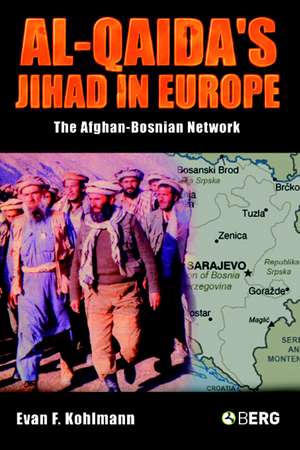Al-Qaida's Jihad in Europe: The Afghan-Bosnian Network
Autor Evan F. Kohlmannen Limba Engleză Hardback – 31 aug 2004
| Toate formatele și edițiile | Preț | Express |
|---|---|---|
| Paperback (1) | 173.25 lei 6-8 săpt. | |
| Bloomsbury Publishing – 31 aug 2004 | 173.25 lei 6-8 săpt. | |
| Hardback (1) | 598.19 lei 6-8 săpt. | |
| Bloomsbury Publishing – 31 aug 2004 | 598.19 lei 6-8 săpt. |
Preț: 598.19 lei
Preț vechi: 695.56 lei
-14% Nou
Puncte Express: 897
Preț estimativ în valută:
114.48€ • 119.08$ • 94.51£
114.48€ • 119.08$ • 94.51£
Carte tipărită la comandă
Livrare economică 15-29 aprilie
Preluare comenzi: 021 569.72.76
Specificații
ISBN-13: 9781859738023
ISBN-10: 1859738028
Pagini: 256
Ilustrații: bibliography, index
Dimensiuni: 156 x 234 x 20 mm
Greutate: 0.51 kg
Ediția:New.
Editura: Bloomsbury Publishing
Colecția Berg Publishers
Locul publicării:London, United Kingdom
ISBN-10: 1859738028
Pagini: 256
Ilustrații: bibliography, index
Dimensiuni: 156 x 234 x 20 mm
Greutate: 0.51 kg
Ediția:New.
Editura: Bloomsbury Publishing
Colecția Berg Publishers
Locul publicării:London, United Kingdom
Caracteristici
Also available in paperback, 9781859738078 £15.99 (September, 2004)
Notă biografică
Evan F. Kohlmann is an International Terrorism Consultant based in Washington, DC. He has served as an expert witness on Al-Qaida and Usama Bin Laden in post-9/11 federal terrorism trials held in the U.S. His articles have appeared in the New York Post, FoxNews.com, and the National Review, and he is frequently interviewed as a terrorist expert in the major media, including NBC, CNN, and Fox news programs.
Cuprins
Notes from the AuthorPrologue: 'In the Land of Ice Cream'Chapter 1: The Afghan CrucibleChapter 2: Jihad comes to BosniaChapter 3: The Role of the Islamic CharitiesChapter 4: The Battle BeginsChapter 5: Confrontation with the CroatsChapter 6: Attention Turns WestwardChapter 7: The Final CampaignChapter 8: A Post-Dayton Wave of TerrorChapter 9: Blowback - The North African Sleeper Cell NetworkChapter 10: Post-9/11 Implications for BosniaEpilogue: Lessons of the 'Afghano-Bosniaks'
Recenzii
Superbly researched, this book tells the story of al-Qaida's birth in 1980s Afghanistan, and the subsequent training of militant Islamists for transportation to Bosnia: ostensibly to fight alongside their fellow Muslims against the Serbs and then Croats but really, as Kohlmann shows, to establish a permanent base for subsequent terrorist operations against European targets. There is an especially interesting chapter on the Saudi-funded charities that channelled money for arms into the conflict, some financing the 1993 World Trade Center bombing.
It is as eloquent a refutation as one could hope to read of the idea that Izetbegovic's Bosnian Muslims were in any way ideological fellow travellers of Al-Qaida, or its partners in terrorist activity. Written by a genuine expert in the subject - Kohlmann is an International Terrorism Consultant - this is a lucid and informed account of the involvement of the mujahedin in Bosnia, one that lays the myths to rest. This excellent book is essential reading for anyone wishing to understand the truth about an episode of the Bosnia war that is so frequently misrepresented by those with a political motive for doing so.
This book is a pathbreaking piece of research into two underexplored aspects of contemporary terrorism. The book is descriptive and empirically rich: the author's main accomplishment is to document the many terrorist incidents the Afghan-Bosnians perpetrated in wartime Bosnia, and post-war cases of terrorist activity rooted in their far-reaching network.
It is as eloquent a refutation as one could hope to read of the idea that Izetbegovic's Bosnian Muslims were in any way ideological fellow travellers of Al-Qaida, or its partners in terrorist activity. Written by a genuine expert in the subject - Kohlmann is an International Terrorism Consultant - this is a lucid and informed account of the involvement of the mujahedin in Bosnia, one that lays the myths to rest. This excellent book is essential reading for anyone wishing to understand the truth about an episode of the Bosnia war that is so frequently misrepresented by those with a political motive for doing so.
This book is a pathbreaking piece of research into two underexplored aspects of contemporary terrorism. The book is descriptive and empirically rich: the author's main accomplishment is to document the many terrorist incidents the Afghan-Bosnians perpetrated in wartime Bosnia, and post-war cases of terrorist activity rooted in their far-reaching network.













